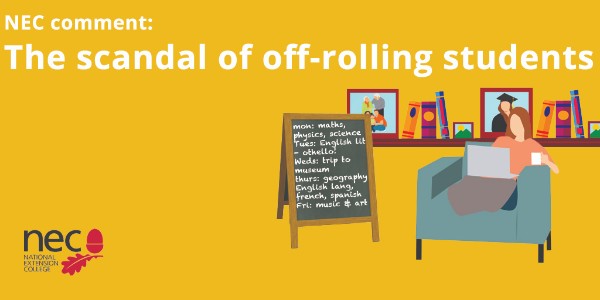The scandal of off-rolling students

The National Extension College, through online distance learning and educational charity, has supported and continues to support a diverse range of students. Although the majority remains adults who wish to return to education, in recent years we have also seen a steady rise in home educating families using our service. Still, within this group too, their backgrounds and reasons for using NEC vary. It may be they enrol with us in order to guarantee an exam place for their child. Some may take all their GCSEs and A levels with us, while others only take one or two subjects.
As a college that has experience of home educators and home educated students, we know that the majority of parents who make the choice to take their children out of school and educate them at home, are aware of the responsibilities and realities of home-schooling, and are prepared and capable to undertake that role.
However, we are increasingly concerned with the recent reports of schools off-rolling students. Off-rolling is where a school removes a child from school without following the formal exclusion process. Often this takes the form of suggesting parents withdraw a child to educate them at home. Reasons for doing this vary, but information obtained from The Children’s Commissioner’s report Skipping School: Invisible Children, and Channel 4’s Dispatches documentary suggests pressure on schools to achieve good exam results, and squeezed budgets resulting in less provision for students with additional needs as the main factors. This would indicate that often the most vulnerable students are affected.
Key points from the report:
- 58,000 children are home educated across England (Though this is considered to be an underestimate).
- 9 out of 10 local authorities (88%) say that they are concerned about off-rolling.
- 22% of children withdrawn from school to be home-educated in 2017/18 had special educational needs.
- Home education rising most rapidly in key stage 4, the critical GCSE years – up by 32% since 2017, possibly evidence of increased off-rolling of pupils who are about to sit their GCSEs and might negatively affect a school’s results.
We support the ongoing work by The Children’s Commissioner’s Office and Ofsted to identify and address off-rolling in schools. We believe the practise of off-rolling is letting down thousands of children, often the most vulnerable, and leaving parents with no realistic expectation of the time, costs and practical considerations involved in educating a child at home.
It is estimated that 9,700 young people between the age of 14-16 were off-rolled last year prior to their GCSEs. We believe the families of these young people should be able to access direct support from the government, if they choose, to take them through the financial and practical obstacles of home-education; such as entering their children for public exams, and access to resources and funding. As highlighted in the Commissioner’s report, the support a family is entitled to varies – some local authorities are helpful but others have no resources.
We shall be following this story closely over the coming weeks and months. We hope that the proposals set by The Children’s Commissioner’s Office will aid all parents and children who require help, without hindering the majority of home educators who chose freely to educate their child at home and are doing an excellent job.
NEC will also be looking into how we can further support home educators, and will look on improvements to our current service, as well as developing new initiatives and further provision for our home educated students.










Responses